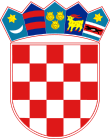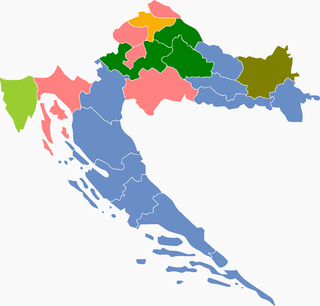- Croatian local elections, 2009
-
Croatian local elections, 2009 
2005 ← 17 May and 31 May 2009 → 2013 HDZ SDP Party HDZ SDP Coalition HDZ-HSS-HSLS SDP-HNS-IDS-HSU Prefects 13 7 Councils 15
(relative winners)6
(relative winners)
Map of the results of the prefect elections in each county. HNS-LDCroatia 
This article is part of the series:
Politics and government of
CroatiaConstitutionJudiciaryExecutive- President (List)
- Ivo Josipović
- Government (List)
- Prime Minister
- Jadranka Kosor
- Cabinet
- Prime Minister
- Croatian Democratic Union (HDZ)
- Social Democratic Party (SDP)
- Croatian People's Party -
Liberal Democrats (HNS-LD) - Croatian Peasant Party (HSS)
- Istrian Democratic Assembly (IDS)
- Croatian Democratic Alliance
of Slavonia and Baranja (HDSSB) - Croatian Social Liberal Party (HSLS)
- Croatian Party of Pensioners (HSU)
- Croatian Party of Rights (HSP)
Divisions
The 2009 Croatian local elections were held on 17 May, with the second round held on 31 May where necessary.
The elections were held to elect members of city councils, mayors, members of county councils and county prefects. These were the first elections in which mayors and county prefects were elected directly by popular vote, rather than by a majority coalition in the council. The new system allowed many independent politicians to run against big party nominees. Many cities elected independent mayors, most notable being Split, Croatia's second largest city and Kaštela. As a result many cities and counties elected opposite lists for mayoral and council elections causing a larger amount of cohabitation local governments.
Results analysis
The Croatian Democratic Union won the largest amount of cities and counties carrying ten prefect elections, thirteen in coalition, and fifteen council elections largely in coalition with the Croatian Peasant Party and the Croatian Social Liberal Party. The Social Democratic Party of Croatia won five prefect elections, seven in coalitions, and six council elections mostly in coalition with the Croatian People's Party - Liberal Democrats and the Istrian Democratic Assembly. The social democrats fared better in mayoral elections as well as in city council elections. They made considerable gains in Dalmatia winning certain traditionally HDZ leaning cities such as Dubrovnik, Šibenik and Trogir and also managed to win Vukovar, a city that was almost destroyed in the Croatian War of Independence and was since a HDZ stronghold. They also kept economically the most powerful parts of the country, Zagreb, Rijeka and, in coalition, Istria. HDZ lost Split and Osijek, the second and the fourth most populous cities in the country respectively, but held Zadar.
Main articles
Zagreb local elections, 2009
Split local elections, 2009
External links
Elections and referendums in Croatia As part of Austria-Hungary (1860s–1918) Kingdom of Croatia-Slavonia Kingdom of Dalmatia Modern Croatia (1990–present) Parliamentary elections Presidential elections Chamber of Counties elections Local elections 1990 · 1993 · 1997 · 2001 · 2005 (Zagreb) · 2009 (Split, Zagreb)Referendums (For the 1918–1989 period see Elections in Yugoslavia) Categories:- Elections in Croatia
- 2009 elections in Europe
- 2009 in Croatia
- President (List)
Wikimedia Foundation. 2010.


